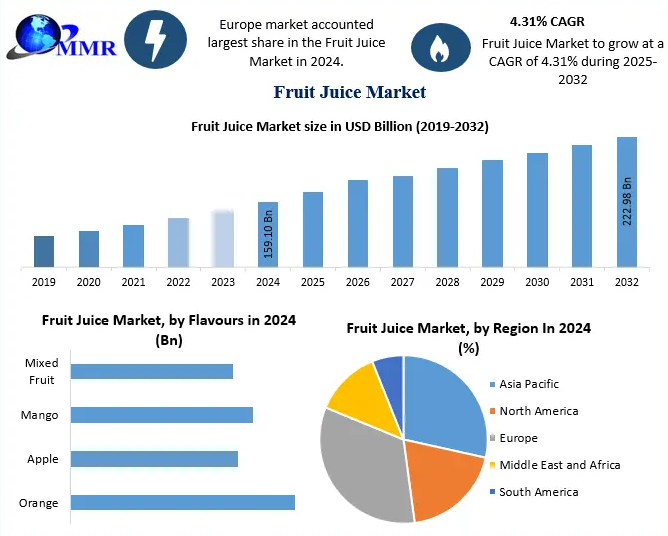Innovation in the Fruit Juice Market : A Trends and Market Size Analysis to 2032

Market Estimation & Definition
The Fruit Juice Market was valued at USD 159.10 billion in 2024 and is projected to reach approximately USD 222.98 billion by 2032, growing at a CAGR of 4.31% from 2025–2032. Fruit juice is defined as a non-alcoholic, unfermented beverage obtained from the mechanical squeezing or softening of whole fruits. The market covers multiple product categories including 100% juices, nectars, juice drinks, concentrates, and powdered juices.
Gain Valuable Insights – Request Your Complimentary Sample Now @ https://www.maximizemarketresearch.com/request-sample/148151/
Market Growth Drivers & Opportunities
Growing health awareness is a significant driver. Consumers are increasingly moving away from carbonated soft drinks and artificial beverages toward natural, nutrient-rich options. Fruit juices, known for their vitamins, minerals, and antioxidants, are perceived as healthier alternatives. The rise of low-sugar, preservative-free, and cold-pressed juices presents major opportunities for premium offerings.
In addition, rapid growth in e-commerce platforms and modern retail formats is reshaping distribution. Online subscriptions, doorstep delivery, and the popularity of single-serve packaging are expanding accessibility, especially in urban centers. Companies focusing on innovative flavors, functional benefits (immunity, digestion, energy), and sustainable packaging are well-positioned to capture future demand.
What Lies Ahead: Emerging Trends Shaping the Future
-
Cold-pressed juices gaining popularity for their nutrient retention and natural appeal.
-
Functional beverages enriched with added vitamins, probiotics, or herbal blends targeting wellness.
-
Sugar-reduction trends pushing manufacturers to create healthier blends and fruit-based alternatives.
-
Sustainable sourcing and eco-friendly packaging becoming decisive consumer considerations.
-
Direct-to-consumer channels and subscription models growing rapidly, particularly among younger demographics.
Feel free to request a complimentary sample copy or view a summary of the report: https://www.maximizemarketresearch.com/request-sample/148151/
Segmentation Analysis
-
By Type: 100% fruit juices, nectars, juice drinks, concentrates, powdered juices, and others.
-
By Flavor: Orange, apple, mango, mixed fruit, and other variants.
-
By Distribution Channel: Hypermarkets/supermarkets, specialty food stores, convenience stores, online retail, and others.
-
By Region: North America, Europe, Asia-Pacific, Middle East & Africa, and South America. Europe is expected to maintain the largest market share through the forecast period.
Dive deeper into the market dynamics and future outlook: https://www.maximizemarketresearch.com/request-sample/148151/
Country-Level Analysis
-
United States: The U.S. fruit juice market is mature but evolving, with strong demand for cold-pressed, organic, and functional juices. Established players such as Coca-Cola, PepsiCo, and Ocean Spray dominate, but niche health-focused brands are gaining traction through online sales and premium retail channels.
-
Germany: A leading European market, Germany emphasizes organic certification, natural ingredients, and sustainable practices. German consumers show high preference for premium juices, innovative flavor blends, and environmentally conscious packaging, creating opportunities for both multinational and local brands.
Competitor Analysis
The competitive landscape is a mix of global giants and regional innovators. Multinational companies leverage scale, branding, and distribution, while regional players focus on differentiation through freshness, unique flavors, and organic positioning. Key strategic moves include new product launches, partnerships, and expansions into online direct-to-consumer models. Emerging brands specializing in cold-pressed and organic juices are becoming strong challengers to traditional market leaders.
Conclusion
The global fruit juice market is set to experience sustained growth through 2032, driven by rising health awareness, innovation in product offerings, and the growing influence of digital retail channels. Companies that align with consumer demand for healthier, sustainable, and convenient beverage options will capture the most value. For stakeholders, the path forward lies in innovation, premiumization, and strong branding strategies that meet evolving lifestyle needs.
About Us- Art
- Causes
- Crafts
- Dance
- Drinks
- Film
- Fitness
- Food
- Spiele
- Gardening
- Health
- Startseite
- Literature
- Music
- Networking
- Andere
- Party
- Religion
- Shopping
- Sports
- Theater
- Wellness



